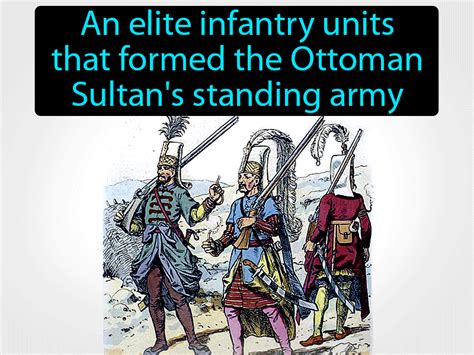Introduction

The Janissaries were an elite corps of infantrymen who served as the backbone of the Ottoman Empire’s military for over centuries. They were known for their loyalty, discipline, and military prowess, and played a pivotal role in the empire’s expansion and success.
Definition
The Janissaries were a unique military force, composed of young Christian boys who were taken from their families and converted to Islam. They were recruited through the devshirme system, a form of child levy that was enforced throughout the Ottoman Empire. Recruits were typically taken from the Christian populations of the Balkans, Anatolia, and the Caucasus.
Training and Organization
The Janissaries underwent rigorous training from a young age. They were trained in archery, horsemanship, swordsmanship, and other military skills. They were organized into regiments, each with its own commander and standard-bearer.
Role in the Ottoman Empire
The Janissaries served a variety of roles in the Ottoman Empire. They were the primary infantry force of the army, and they played a leading role in major military campaigns. They also served as the imperial guard, protecting the sultan and the royal family. Additionally, they were used to maintain order in the empire’s territories and to suppress rebellions.
Decline and Abolition
Over time, the Janissaries became increasingly powerful and politically influential. They often interfered in government affairs and occasionally revolted against the sultan. In the 19th century, the Janissaries were seen as a threat to the empire’s modernizing efforts, and they were disbanded in 1826 by Sultan Mahmud II.
Legacy
The Janissaries left a lasting legacy on the Ottoman Empire and the world. They were one of the most feared and respected military forces in history, and their unique system of recruitment and training influenced the development of other military organizations. The Janissaries also played an important role in the cultural and social history of the empire, and their influence can still be seen in Turkey today.
Key Characteristics of the Janissaries
- Recruited through the devshirme system from Christian families
- Converted to Islam and trained in a variety of military skills
- Organized into regiments with their own commanders
- Played a pivotal role in the Ottoman Empire’s military and political history
- Known for their loyalty, discipline, and military prowess
Tables
Table 1: Janissary Recruitment by Region
| Region | Percentage |
|---|---|
| Balkans | 50% |
| Anatolia | 25% |
| Caucasus | 25% |
Table 2: Janissary Training
| Skill | Years of Training |
|---|---|
| Archery | 5 |
| Horsemanship | 3 |
| Swordsmanship | 2 |
| Other military skills | 1 |
Table 3: Janissary Regiments
| Regiment | Commander |
|---|---|
| Cebelu | Aga |
| Yeniçeri | Yeniçeri Ağası |
| Sipahi | Sipahi Ağası |
Table 4: Janissary Impact on the Ottoman Empire
| Area of Impact | Description |
|---|---|
| Military | Played a leading role in major military campaigns |
| Political | Interfered in government affairs and occasionally revolted |
| Social | Influenced the cultural and social history of the empire |
